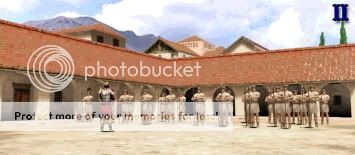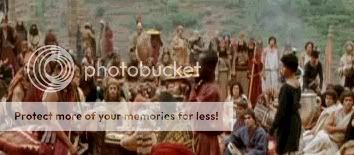This an Baktrian AAR, played on EB 1.2 with official fixes applied, but without any other sub-mods.
Difficulty: Hard campaign, Medium battles
Unlike my previous attempts, this will be almost exclusively text-based AAR, with occasional pictures merely help you relax your eyes from reading. I also aim to write it as if it was in fact a translation of an ancient text, so do not expect too much humour here. I also hope, that unlike my previous ones, this AAR will endure until the campaign is finished satisfactorily. But as I have a job and family to care about, do not expect updates much often - my idea is something like once a week, but I am determined not to let just die.
Hope you will enjoy!
This is the Book of Kings, written by me, Oxobazes son of Ariarathes of Baktria, so that to record the things to which I personally bear witness or heard of from reliable sources, so that they shall not fail into oblivion.
For the history of our ancestors is part of the eternal struggle between Truth and Lie, which is taking place through human agency within the heart of each individual man, I have written this book.
For the great deeds of the past be remembered to inspire us to follow suit and inspire future generations to surpass them in glory I have written this book.
For the shameful deeds of the past to be remembered to deter us from acting in disgraceful manner I have written this book.
To warn the proud by showing many cases where the slippery fortune had raised men to glorious heights and thrown them down in the next moment so they lost what they had had before I have written this book.
To encourage the despairing by showing them that even the gravest misfortune will come to end eventually and sometimes could prove to be actual blessing by mobilizing their best efforts and thus enabling them to prevail with much glory against overwhelming odds I have written this book.
And to demonstrate that the only ambition which is worth any effort is to be remembered as one who lived and died in Truth I have written this book. Alas! after all any mundane human endeavour is in vain: great empires are doomed to fall and riches to be wasted in the same manner as individual life - regardless whether good or evil, fortunate or miserable - will result in death eventually.
Theodotos was appointed as Satrap of Baktria amidst the great turmoil that followed the death of Alexandros when his former generals were waging war on each other for supremacy. He found his province to be blessed by nature, being of fertile soil and rich in precious metals and inhabited of numerous people accustomed to enjoy considerable wealth and unsurpassed prestige among the other nations within the former empire of Median Shananshahs and beyond. Yet the present state of the country fell short of its potential due to recent wars, tension between native Baktrians and Hellenes who came with the army of Alexandros and afterwards, restive landlords never hesitating to attack their neighbours whenever deemed advantageous, and countless brigands ravaging the country from their mountain strongholds.
He was convinced that to enjoy fully the amenities his ruling position offered to him his realm had to be brought to peace, rule of law and recognition of his authority first. Being vigorous in spirit as well as in body and ambitious by nature, he gathered troops stationed in Baktra and set out on campaign to punish all offenders and settle things in cities and countryside according to his will. Within a few years Baktria was pacified to the great benefit of both the people and the ruler.
However its prosperity attracted many warlords from neighbouring provinces, which were in much worse state, to prey on its riches. Thus to maintain peace at home Theodotos was obliged to wage war abroad to deal with this menace. And glad he was to do so, as it provided him with the opportunity to spread his authority beyond the boundaries of the province commended to him by the Great King Antiochos and to draw upon the resources of newly gained territories. In this way he annexed Paropamisadai to his realm and appointed a general of his in Kophen to oversee this province.
Local levies instructed in Bactrian garrison yard in Kophen
In enforcing his rule throughout his lands Thodotos on several occasions crossed the boundaries of neighbouring satrapies of Aria, Drangiana and Arachosia, boundaries that were precisely defined in law but hardly recognizable in practice. The respective satraps considered this as an encroachment on their prerogatives, in spite of the fact that they had hardly any control over their nominal subjects in those borderline lands. But they were jealous of the might and wealth of Theodotos and desired to bring him down and take Baktria by themselves. Therefore their protested in front of the Great King and demanded that Theodotos be called off and punished accordingly. They also denigrated him, saying that Theodotos wants to throw down Antiochos and himself be the Great King (which was not true) and for that purpose he builds-up a strong army (which was partly true) and does not pay his tribute to the Great King in full but takes its bigger share for himself (which was true, as Theodotos indeed preferred that the income from taxes gathered in Baktria be spent there to embellish and strengthen the country rather than be sent to Syria to finance the court of the Great King).
Antiochos - hard pressed on all sides by the Ptolemy in Syria, Mithradates in Asia Minor and recent invasion of Pahlavans into Astauene, Parthia and deeper - was at first reluctant act upon these allegations, because it would surely make Theodotos a new enemy of his. On the other hand the Great King thought it more prudent to prevent any other power from arising at all, be it friendly or not, rather than to allow it to grow too strong to be stopped later, should it turn hostile to him. Therefore he finally called Theodotos to Seleukeia for trial and when he refused to come thither, Antiochos gave his assent to the three eastern satraps to make war on Baktria and depose Theodotos by the force of arms.
Confident that mere show of force and the authority of the Great King will immediately bring forward the downfall of Theodotos, armies of the three satraps invaded Baktria and marched on Baktra, pillaging the country in their path. However, the Baktrian army remained loyal to Theodotos, who paid them regularly and quite well, whereas the people were grateful to him as Theodotos ruled justly and re-established law and order throughout the country. Thus Theodotos was safe in his refusal to submit and marched forward against the invaders and crushed them in the field. Recognizing that he is now in open war with the Great King he did not remain in defensive, but pressed forward to secure his land by annexing the neighbouring satrapies meeting little resistance on his path.
At the time when Baktrian armies were campaigning in Aria, besieging Alexandria-Ariana, the Great King Antiochos died in Babylon, on the same day as Alexandros did 63 years earlier. He was succeeded by his son Theodoros Syriakos, but many refused to recognize him, claiming his illegitimate birth. I do not think that there was any truth in these rumours, but I am convinced that they were spread on purpose by those who desired to grab the Kingdom, or at least a part of it for themselves. The whole Arche Seleukeia thus fell into even deeper turmoil than before and its neighbours did not hesitate to avail themselves of the opportunity thus presented to them by internal strife and grabbed even more of the formerly Seleukid lands.
Theodotos too used the pretext of illegitimacy of Theodoros Syriakos to certify his factual independence and ten days after following winter solstice (translators note: i.e. January 1, 259 BC) he was crowned as Basileus Baktrios and established the anniversary of this event as a national festival Eleutheria (Independence) and the beginning of Baktrian calendar.
People gathering in Baktra to celebrate the festival of Eleutheria (Independence)
In three consecutive campaigns in the course of the first three years of Eleutheria Baktrian armies led by Diodotos, son of Basileus Theodotos and his heir, conquered the whole Aria, Drangiana and Arachosia and incorporated them into Basileia Baktria. Afterwards Theodoros Syriakos recognized that the loss is beyond his current capacity to regain and that continuing war could only cause him to lose even more of the territories which still acknowledged his suzerainty. Theodotos on the other hand was quite satisfied with his conquest and prudent enough to be afraid of overstretching himself. Therefore both kings entered into negotiations that ratified the status quo. Theodoros Syriakos formally recognized Basileus Thodotos as lord over Baktria, Paropamisadai, Aria, Drangiana and Arachosia, collectively known as Basileia Baktria. From now on Basileia Baktria should be considered of equal terms with Arche Seleukeia, free of tribute and without any further obligations, namely with no alliance, be it offensive or defensive, existing between the two Kingdoms. Theodotos, for his part, formally recognized Theodoros Syriakos as legitimate ruler over his current territories and pledged to refrain from any further incursions beyond the mutually agreed border.
Basileus Theodotos than ruled for twelve more years devoted to consolidation and development of his realm. He reformed the military, so that it was composed entirely of full-time soldiers equipped and paid by Royal Treasury. This was particularly welcomed by the people, who were thus relived of the burden of levies and allow them to devote themselves fully to their various crafts, be it agriculture, artisanship or trade. Theodotos also paid a great devotion to gods, embellishing old temples and erecting new, devoting those particularly to the old Baktrian deities of Ahura Mazda, and Anahita. Despite being Hellen himself, he also promoted laws that stipulated equality between all his subjects, regardless of their nationality, because he much desired that Macedonians, Ionians, Persians, and numerous tribes of the steppes and the mountains will live in accord among themselves forming a new nation of Baktrians. Basileia Baktria became very rich during his reign, as Basileus supported by various stimuli mining of gold and other precious metals and gemstones throughout the country and because merchants were now able to travel across the kingdom without fear of bandits.
In the last days of his life Theodotos often advised his son and heir Diodotos to be ware of the Seleukid King and his satraps, to be on friendly terms with the Sakae in the north and the Pahlavans to the west and above all to pay more attention to development of the lands he already has rather than to acquiring of the new. Theodotos died on the first day of harvest in the year twelwe of Eleutheria (translators note: i.e. mid-August 248 BC) in Baktra at the age of sixty-three. Thus ended the reign of the first Basileus Baktrios Theodotos of which Oxobazes was the historian.














 Reply With Quote
Reply With Quote
Bookmarks